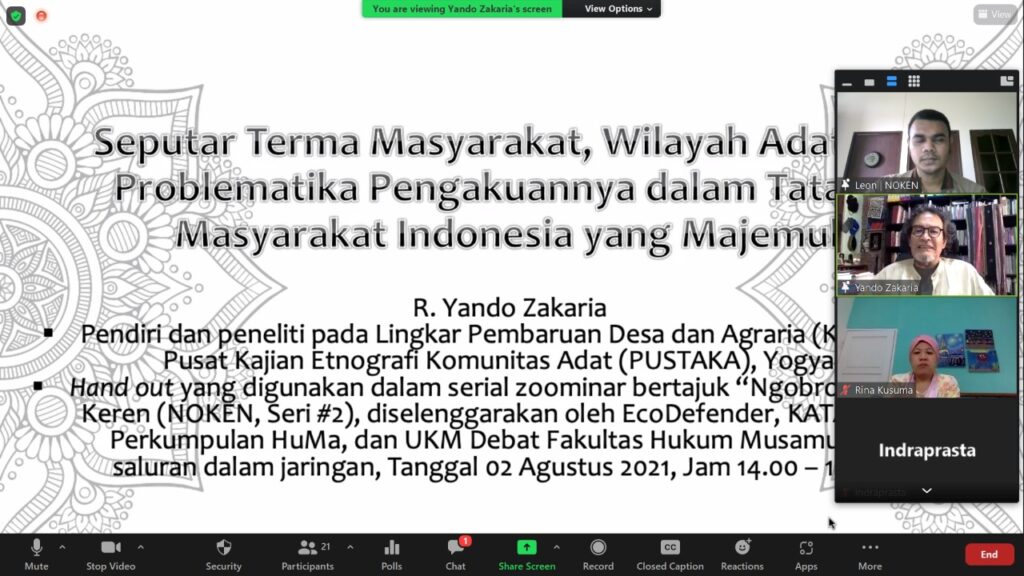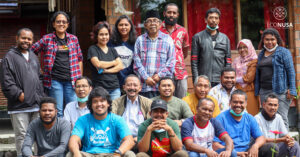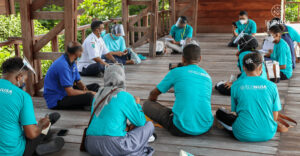
The indigenous peoples issue is still an ongoing topic due to the absence of legal rule that takes sides and recognizes their existence and sovereignty in Indonesia. Meanwhile, the deprivation of customary rights and territories continues to occur so that indigenous peoples are increasingly marginalized. On the other hand, many parties are fighting for indigenous peoples to get recognition with more supporting policies.
The struggle and future of indigenous peoples are also determined by the awareness of the younger generation, especially indigenous youths. Seeing this, on March 26, 2022, the EcoNusa Foundation through EcoDefender, together with KATA Indonesia, HuMa, and Musamus University held a NOKEN (Cool Environment Chat with EcoDefender) event titled “Agrarian Concepts and Customary Rights”.
This time, NOKEN presented Revoliyando Zakaria, an expert on customary issues as well as founder and researcher of the Village and Agrarian Reform Circle (KARSA), and the Indigenous Community Ethnography Center (PUSTAKA), and was guided by Leonardo Numberi from EcoDefender.
Revoliyando presented indigenous people terminology, customary territory, and the recognition problems in Indonesia. The issue of indigenous peoples in Indonesia has become a public discussion and discourse since the country’s inception, but its echo faded when the New Order came to power.
Indigenous people’s struggle then re-emerged after the rages of the indigenous peoples’ movement in the world which continues fighting for sovereignty at the national level which has not been realized until now. However, the discourse brought to the indigenous peoples’ global movement could not necessarily be adopted into every indigenous peoples’ movement in Indonesia. Adjustment to local situations and conditions is necessary.
Awareness of the indigenous peoples existence and the need for policy instruments have existed since Indonesia’s reformation. This is reflected in the existence of several articles in the 1945 Constitution. Article 18B Paragraph 2 explains the state’s recognition of customary law communities, Article 28I Paragraph 3 concerning respect for cultural identity and rights of traditional communities, and Article 32 explains maintaining and promoting a national and regional culture that includes local communities.
Unfortunately, the term “indigenous peoples” is not obviously written in the constitution of the Republic of Indonesia. In fact, this term is used in every struggle for the sovereignty of indigenous peoples. Therefore, Revoliyando said that the use of the term “indigenous peoples” needs to be adapted to its function and context. When talking about political recognition, the meaning of “indigenous peoples” refers to the definition of customary law community and traditional community. Meanwhile, on the topic of recognition of customary rights, the definition is used in the context of customary law communities. The meaning of indigenous peoples as local people is used more in a more general cultural context.
“Actually, a big problem in the polemic about indigenous community recognition in our state regulations is caused by the lack of sharpness in defining the functional context for the term indigenous peoples themselves,” said Revoliyando.
The rights of customary land (ulayat) belong to the authority of indigenous peoples to control, regulate, manage, utilize, and supervise a single geographical and social area along with all the natural resources contained therein with certain limitations from generation to generation based on customary law.
Revoliyando also explained the definition of ulayat based on the Beschikking Recht theory proposed by Van Vollenhoven. This theory argues that customary rights are the authority of customary communities over undeveloped land, regulate the use of community land, payments for land use by community members, regulate residents on land that is being cultivated, territorial responsibilities, and the perpetuation of community rights. Based on this theory, ulayat rights are public-private and become communal rights. There are also private rights regulated by customary holders in a group of indigenous peoples.
According to Revoliyando, the diverse order of customary law systems owned by indigenous peoples in Indonesia is something that should be taken into consideration in the process of designing policies that regulate customary rights, including ulayat.
“Each group of indigenous peoples has a different customary law system. This makes the various complexities of customary law necessary to consider when the policy process is made. The lack of order in thinking in the design of legal instruments to regulate customary rights is a big issue. It should use a holistic perspective from the first place, contextual to local conditions. This is what ultimately causes problems,” added Revoliyando.
The track record shows that the policies governing the customary rights of indigenous peoples in Indonesia have shifted from one regulation to another. Now the constitution that regulates this is in the Law Number 11/2020 concerning Job Creation (Undang-undang Cipta Kerja), mandating the rights of indigenous peoples, customary forests, and customary land (ulayat) are recognized by the state as long as the indigenous peoples’ recognition has been stipulated by a Regional Regulation. This rule adds to the existing problems. The reason is that it is not easy for indigenous peoples to get official recognition of their rights and authority from the Regional Government which is stipulated through Regional Regulations.
“Unfortunately, although there are many legal frameworks that Indonesia has to regulate this, it does not bring any change. Therefore, we must be critical of the existing policies. We also need tactics and open space in fighting for the rights and interests of indigenous peoples,” Revoliyando concluded.
Editor: Leo Wahyudi








